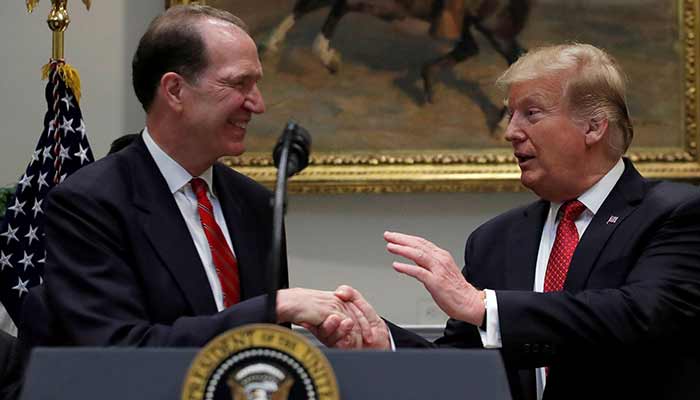A change of presidency at the World Bank: What does it mean for Pakistan?
If Trump can get his nominee to head the World Bank, what would that mean for China and Pakistan?
February 28, 2019

Despite all the talk of democracy being vital for development, the fact remains that the largest international development organisations in the world are not very democratic themselves.
Based on a post-WW2 arrangement, the International Monetary Fund (IMF) is always headed by a western European, and the World Bank by an American.
The World Bank, with its mission to promote long-term economic development and poverty reduction across the so-called developing world, has long been an advocate of market-based policies. Over the past several decades, it has compelled poorer countries to curb public spending and instead encourage the private sector to provide vital services, such as health and education, and to open their economies to the forces of globalisation. The impact of these reform policies on alleviating poverty or addressing glaring global disparities remains mixed at best.
However, when former US President Barack Obama had nominated Jim Kim to head the World Bank back in 2012, there was genuine enthusiasm that this appointment would signal a change in how this powerful development lending agency works. Many had hoped that being an anthropologist and public health expert, who has spent years working with poor people on the ground, Kim would steer the Bank away from its neoliberal stance.
Instead, once he assumed his new role, Kim found himself needing to deal with the challenge of making the World Bank a more relevant entity, in a world flush with private capital, whereas the Bank, comparatively, had very limited funds at its disposal.
In the bid to mute the criticism of the World Bank being dysfunctional and inefficient, Kim brought in scores of management consultants to overhaul the bank's structure and operating budget. Using highly paid consultants to identify redundancies, pay freezes, and benefit cuts was certainly not a popular move with the World Bank staff. On the other hand, the pace at which Kim began wooing venture capitalists and big corporations to work with the World Bank to invest in developing countries raised concerns even amongst market-based enthusiasts that the World Bank was losing sight of its mandate to provide technical advice and support to the developing world.
Just as unexpectedly as Kim presided over the Bank, he decided to abruptly resign from his post, three years before the end of his term. Having gotten a taste of hobnobbing with big business, Kim is now reportedly planning to join a private equity firm. This sudden resignation has provided US President Trump an opportunity to nominate a new head of the World Bank. Having apparently resisted the urge of nominating his own daughter to this position, earlier this month Trump nominated David Malpass, a top Treasury official to replace Kim.
Malpass, a Trump loyalist, currently serves as undersecretary of the US Treasury for international affairs. Malpass has made no bones about being suspicious of multilateral agreements and international cooperation. This makes him a strange choice to head an organisation like the World Bank. There is, however, one clear reason why he would be a preferred choice for this powerful position, and that is his tough stance on China. Malpass been especially critical of the fact that China, the world's second-largest economy, is the World Bank's biggest borrower.
Malpass' nomination is still subject to a vote by the World Bank's executive board. If the US manages to convince the Europeans to back its nominee, we will see the World Bank take an increasingly hostile approach towards China. Moreover, countries like Pakistan will also face a much tougher time getting World Bank support in the future given that we are already under IMF scrutiny, to ensure that its potential loans to Pakistan are not used to repay Chinese debt incurred due to the China-Pakistan Economic Corridor project.
Instead of trying to transcend its obsession with use of market-based economic growth policies, which invariably favour those with access to capital, or striving to address the growing problem of global inequalities, the World Bank now seems poised to become another pawn in a geostrategic tussle between the US and China, which certainly will not be a step in the right direction.
Ali is a development anthropologist











